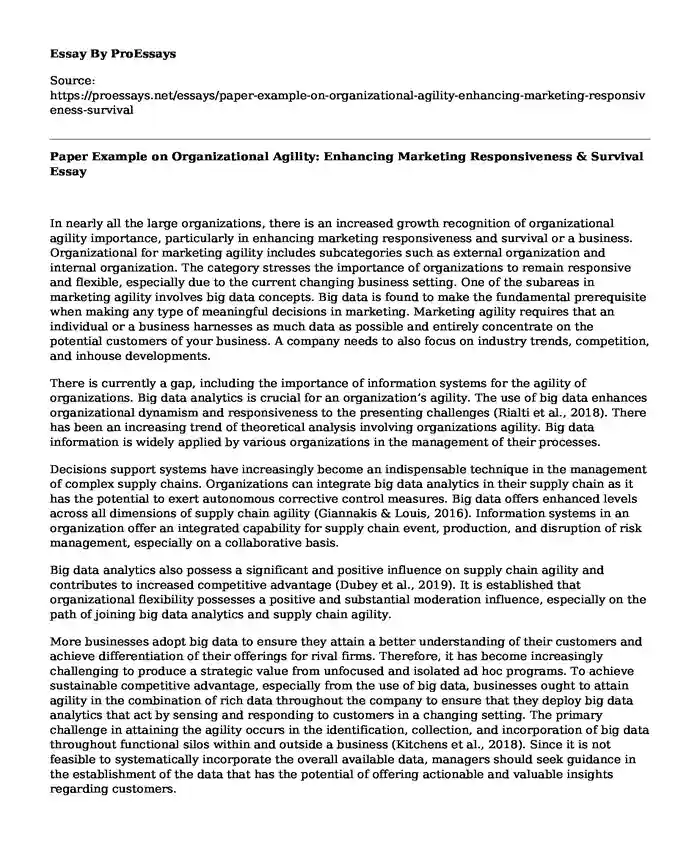In nearly all the large organizations, there is an increased growth recognition of organizational agility importance, particularly in enhancing marketing responsiveness and survival or a business. Organizational for marketing agility includes subcategories such as external organization and internal organization. The category stresses the importance of organizations to remain responsive and flexible, especially due to the current changing business setting. One of the subareas in marketing agility involves big data concepts. Big data is found to make the fundamental prerequisite when making any type of meaningful decisions in marketing. Marketing agility requires that an individual or a business harnesses as much data as possible and entirely concentrate on the potential customers of your business. A company needs to also focus on industry trends, competition, and inhouse developments.
There is currently a gap, including the importance of information systems for the agility of organizations. Big data analytics is crucial for an organization’s agility. The use of big data enhances organizational dynamism and responsiveness to the presenting challenges (Rialti et al., 2018). There has been an increasing trend of theoretical analysis involving organizations agility. Big data information is widely applied by various organizations in the management of their processes.
Decisions support systems have increasingly become an indispensable technique in the management of complex supply chains. Organizations can integrate big data analytics in their supply chain as it has the potential to exert autonomous corrective control measures. Big data offers enhanced levels across all dimensions of supply chain agility (Giannakis & Louis, 2016). Information systems in an organization offer an integrated capability for supply chain event, production, and disruption of risk management, especially on a collaborative basis.
Big data analytics also possess a significant and positive influence on supply chain agility and contributes to increased competitive advantage (Dubey et al., 2019). It is established that organizational flexibility possesses a positive and substantial moderation influence, especially on the path of joining big data analytics and supply chain agility.
More businesses adopt big data to ensure they attain a better understanding of their customers and achieve differentiation of their offerings for rival firms. Therefore, it has become increasingly challenging to produce a strategic value from unfocused and isolated ad hoc programs. To achieve sustainable competitive advantage, especially from the use of big data, businesses ought to attain agility in the combination of rich data throughout the company to ensure that they deploy big data analytics that act by sensing and responding to customers in a changing setting. The primary challenge in attaining the agility occurs in the identification, collection, and incorporation of big data throughout functional silos within and outside a business (Kitchens et al., 2018). Since it is not feasible to systematically incorporate the overall available data, managers should seek guidance in the establishment of the data that has the potential of offering actionable and valuable insights regarding customers.
Conclusion
The studies recommend further research on the phenomenon by exploring exemplary firms, making comparisons in varying industries and markets. There is also a need to perform quantitative analysis to offer information regarding the importance of the implications of big data analytics in attaining organization agility. The research should attempt to quantify the results based on the importance of efficiency. Particularly, there is a need to establish a clear link between organizational agility and performance. Future research could focus on the building of theories such as inquiry regarding agent-based technology and how it promotes supply chain sustainability.
References
Dubey, R., Gunasekaran, A., & Childe, S. J. (2019). Big data analytics capability in supply chain agility. Management Decision. https://doi.org/10.1108/MD-01-2018-0119
Giannakis, M., & Louis, M. (2016). A multi-agent-based system with big data processing for enhanced supply chain agility. Journal of Enterprise Information Management. https://doi.org/10.1108/JEIM-06-2015-0050
Kitchens, B., Dobolyi, D., Li, J., & Abbasi, A. (2018). Advanced customer analytics: Strategic value through the integration of relationship-oriented big data. Journal of Management Information Systems, 35(2), 540-574. https://doi.org/10.1080/07421222.2018.1451957
Rialti, R., Marzi, G., Silic, M., & Ciappei, C. (2018). Ambidextrous organization and agility in big data era. Business Process Management Journal. https://doi.org/10.1108/BPMJ-07-2017-0210
Cite this page
Paper Example on Organizational Agility: Enhancing Marketing Responsiveness & Survival. (2023, Sep 23). Retrieved from https://proessays.net/essays/paper-example-on-organizational-agility-enhancing-marketing-responsiveness-survival
If you are the original author of this essay and no longer wish to have it published on the ProEssays website, please click below to request its removal:
- Stolen Without a Gun Ethics Essay
- Research Paper on Consumer Behavior
- Investigation on the Demolition Market Over the Past Five Years Paper Example
- Essay Sample on Innovative Media Coverage and Promotion
- Essay Example on Leadership: Traits of Good & Bad Leaders Explored
- Essay Example on Amazon Focuses on Data Analytics to Improve Customer Relationships
- Free Essay on Strategic Planning and Decision-Making: Navigating the Path to Organizational Success







